"Dust is our greatest foe"
Lubricant-free lead screw units for a bottling plant of in-vitro diagnostics (IVD)
Contamination must be excluded in the medical and lab technology fields in order to obtain reliable diagnostic results. Trapezoidal lead screws with matching nuts were installed at several locations on this fully automated bottling plant for medical products. Miniature versions of linear guides are also involved. All mechanical components are lubricant-free and also nearly devoid of particle emissions, making them suitable for cleanroom applications. And the best part is: these are catalog products that are available from one day to the next.
We have been developing and designing medical devices and system solutions for many years. Our focus is on analytical medical technology", explains Dipl.-Eng. (FH) Christian Baumann, the namesake for the Herbolzheim based engineering firm. "Our spectrum ranges from individual devices to series equipment in small, medium and large volumes. Precision and reliability are their hallmarks. As a matter of principle, we only install mature and proven components that are validated in the medical environment over time. This always gives us the best possible results. “
We have been developing and designing medical devices and system solutions for many years. Our focus is on analytical medical technology", explains Dipl.-Eng. (FH) Christian Baumann, the namesake for the Herbolzheim based engineering firm. "Our spectrum ranges from individual devices to series equipment in small, medium and large volumes. Precision and reliability are their hallmarks. As a matter of principle, we only install mature and proven components that are validated in the medical environment over time. This always gives us the best possible results. “
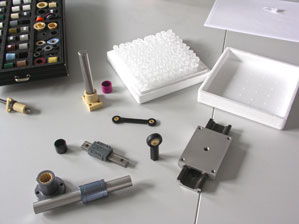
Linear plain bearings made from high-performance polymer in a bottling application. The production output is stored in the styrofoam box: High-value reagents for in-vitro diagnostics.
For many years, the engineering firm has relied on polymer bearings and linear guides made by igus® GmbH, Cologne. There are various reasons for this: On the one hand, this is driven by their lack of lubricants, and on the other by the reliability of the machine elements. In connection with this, the ease of maintenance of these components in the field also plays an important role. However, when problems do occasionally arise, the corresponding components must be exchangeable quickly and without difficulty. Nobody can afford the costs resulting from long plant or machinery shutdowns. "Here as well, we have had nothing but the best experience. We have not had a history of failures in any area", claims Christian Baumann.
The engineering firm is deeply familiar with the plastic products. "Over the years, we have been provided with a host of sample components", states Christian Baumann.
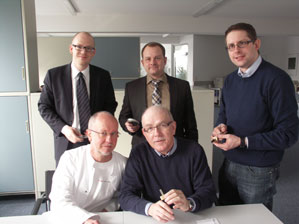
Seated from left: Manfred Rüdinger (bionanalytic GmbH), Albrecht Baumann (Konstruktion Baumann). Standing from left: Dominik Hartmann, Adrian Belke (both igus® GmbH) and Christian Baumann (Konstruktion Baumann).
"For our complex designs, this is more than helpful for the components that are provided to us when developing a product since we can develop an up-front feel to determine whether a component is suited for the various motion profiles and whether it is likely to meet the requirement. And should a problem or a question come up, a phone call suffices to obtain prompt assistance." “
In 2010, the highly specialized engineering firm with its five employees received a request to design and build a fully automated IVD bottling plant. Its job consists of accurately filling so-called reaction vessels with lab-diagnostic reagents in volumes of only a few micro-liters up to approx. 1.5 ml. The next process step involves completely sealing the reaction vessels and placing these in styrofoam trays that also serve as the primary packaging. These produced units are part of a lab-diagnostic test kit to test blood cells, joint fluids, spinal and brain fluid, as well as sperm. All tests are used by human and veterinary labs. The engineering firm has already had years of extensive experience with plants of this nature.
Already in 1978, the firm was the first to bring to market a specimen distribution system with a capacity of 400 specimens per hour. This was the first time processes were automated. Only two years later, the system enabled the full identification of patient specimens. This was followed by opening devices for sample vessels of all types, rinsing heads for the specimen distribution area and a linear specimen distribution system for the lab area. . "We therefore knew exactly what our customer had in mind", explains Albrecht Baumann, the founder of the engineering firm. The engineering firm is eminently familiar with the tasks of pipetting and distributing minute volumes.
"We defined a host of specifications for this custom fluid handling plant, which is most likely unique world-wide", the client, the engineer for biomedical analytics, Manfred Rüdinger, from bioanalytic GmbH in Umkirch near Freiburg, states in retrospect.

View of the entire IVD bottling plant.
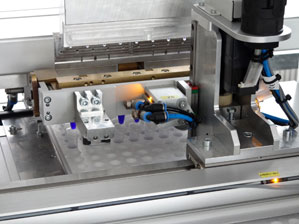
Vessel feeding.
"On the one hand this involves a clean bottling process, which is not necessarily sterile but certainly highly clean. And on the other, the bottled volume for each reagent must reliably correspond to the specifications. After all, this is one of the most important factors to accurately determine the cell count. And ultimately automating this task is no simple matter."
The two companies found each other via the Internet. "We were looking for a regional supplier, and as luck would have it, we found someone close by", states Manfred Rüdinger. "We knew that we needed to work together closely well beyond the development and building phases to keep teething issues at bay as best as possible. " Since April 2011, the largely fully utilized IVD bottling plant has been running in routine operation.
The operating principle is relatively straightforward. A vibratory feeder bulk-feeds the protected reaction vessels to the fully automated plant, and then brings these to a pick-off station in an orderly single row. Grippers pick the thin-walled vessels from above; a clamp applies a gentle circumferential grip. They then travel to a pumping unit for bottling before they are brought to the sealing station. A styrofoam box was inserted as a receiver in advance. After the sealing operation, the gripper or clamp opens and the vessel drops gently into the convenient tray.
drylin® lead screw units are used in the area of the feed mechanisms and the stroke movement. For this purpose, the customer is relying on a sliding pair consisting of a trapezoidal lead screw nut made from iglidur® W300 and a rolled trapezoidal lead screw made from 1.4301 materials. Lead screw units are machine elements that convert a rotary motion into a translational motion. drylin® lead screw units are always based on self-lubricating plastic nuts made from highly wear-resistant tribo-polymers, thus enabling life-long operation without external lubrication. The clean room compatibility of the lead screw units is facilitated by avoiding oil and grease. The lead screw units also compel with their low friction values.
The corrosion-resistant drylin® miniature guides also demonstrate their capabilities during the stroke motion of the gripper or clamp. The gliding elements are assembled into the housing with a positive fit. This simple and effective design enables guides that are equally rugged and cost-effective. "The guides in the area surrounding the gripper represent another centerpiece of the plant", explains Christian Baumann. "These must work reliably over time." The gripper tongs hold the vessels, accurately position these for bottling and reliably absorb the forces that occur during the sealing process. There are few, if any, other mechanical loads, since the styrofoam boxes are extremely light.
"There are many manufacturers of trapezoidal lead screw units", reports Christian Baumann. "With respect to the igus® solution, we particularly like the combination of the stainless steel lead screw with the maintenance-free nut made from specialty plastics." The low friction value under dry-running conditions and the gliding pair of the lead screw unit are field proven. The low weight of the mechanical components is an additional benefit with a favorable impact on the overall weight of the plant. However, speed plays only a minor role in the overall process. "The processes take place within seconds", Albrecht Baumann explains. "These do not place particular requirements on the machine elements. The focus is on precision when feeding the vessels."
The topic of avoiding lubricants and maintenance plays an important role, especially in the medical technology and lab fields. Other igus® products, such as the aforementioned linear systems, anti-backlash lead screw nuts, FDA compliant materials and particle or abrasion-resistant materials for clean rooms, can also demonstrate their capabilities in this complex environment. Corrosion-resistance is yet another requirement that can be addressed with these systems. All described products are standard components from the catalog. They are typically available on the spot. Custom components are also available upon demand.
It took about 9 months from the development to the commissioning of the IVD bottling plant under cleanroom conditions. "Due to the requirements in the field, we knew from the beginning that we would rely on the lubricant-free drylin® linear products. They have proven themselves in a host of applications", Christian Baumann confirms in conclusion. Manfred Rüdinger adds: "Dust is our greatest foe. Dust, which could tamper with the test results, must be avoided during handling at all cost. And this is 100% guaranteed in this case." “
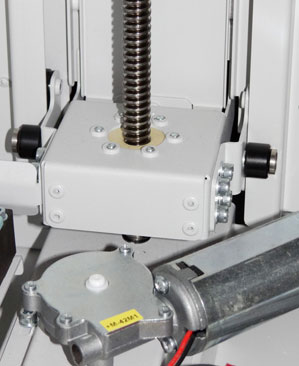
Trapezoidal lead screw for the stroke travel.
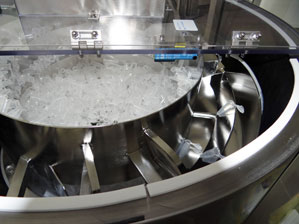
In a first step, the vessels are fed by a vibratory feeder.
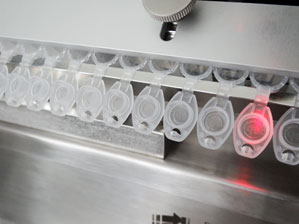
The vessels are tested for the correct orientation before the bottling process.
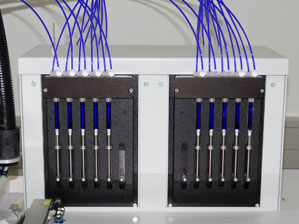
The actual bottling process at the pump station.
Further information
More than 100,000 products available! Delivery and consultation Mon-Fri from 7am-8pm and Sat from 8am-12pm!